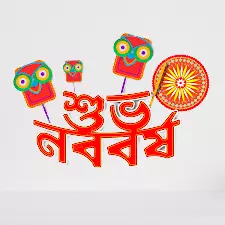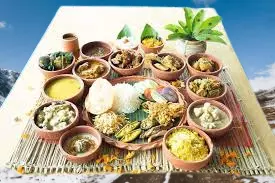Poila Baisakh or Pohela Boishakh is celebrated with a whole lot of pomp and grandeur. One of the most special festivals of the Bengali community, Poila Baisakh announces the commencement of the Bengali New Year. The day is spent in the company of family members, friends, near and dear ones. Poila Baisakh is celebrated by the Bengali communities of West Bengal, Assam and Bangladesh. People, on this day, greet each other saying Shubho Nobo Borsho ( Happy New Year ). Bengalis are a cheerful community with their never ending festivities and festive spirit.
Poila Baisakh also brings the promise of a better tomorrow and the hope of prosperity, joy, health and wealth. Every year, Poila Baisakh is celebrated on April 15.

This year it will be celebrated on 15th April, Saturday’2023. People await the day to celebrate it with their loved ones and welcome the new year with new promises. In Bangladesh, Poila Baisakh is celebrated on April 14.
Poila Baisakh, Pohela Boishakh
Poila Baisakh or Pohela Boishakh is the first day of the Bengali calendar which is also the official calendar of Bangladesh. This festival is celebrated on 14 April in Bangladesh and 15 April in the Indian states of West Bengal, Tripura, Jharkhand and Assam (Barak Valley) by Bengalis regardless of religious faith.
The festival is celebrated with processions, fairs and family time. The festive Mangal Shobhajatra is organized in Bangladesh. In 2016, the UNESCO declared this festivity organized by the Faculty of Fine Arts, University of Dhaka as a cultural heritage of humanity.
In Bengali, the word Pohela means ‘first’ and Boishakh is the first month of the Bengali calendar. Bengali New Year is referred to in Bengali as Nobo Borsho where ‘Nobo’ means new and ‘Borsho’ means year.
Celebration & Significance
Before the beginning of the new year, Bengalis rush to avail themselves of a copy of their Panjika and plan the yearly events accordingly. This year-long handbook marks the auspicious timings to conduct any special events along with its dates and timings.
From planning a new business to fixing wedding dates, everything is planned according to Panjika. We have it all covered only after going through the auspicious times and dates available in a Panjika. It is an inseparable part of the ‘Nobo Borsho’ celebrations not only in West Bengal but all over India. Even the Bengalis living in foreign countries take some break from their work to celebrate Nobo Borsho celebrations.

During Pohela Boishakh, people wear traditional attire, namely women clad in saris and men dressed in kurta , visit their families and friends and spend time together. Pohela Boishakh is also known for uniting friends and family after a long time.
The celebration of Bengali new year Pohela Baishakh begins at dawn arranges by the cultural organisation Chhayanaut welcoming the year at Ramna Batamul under the banyan tree in the Ramna Park in Bangladesh.
This day is considered auspicious as it commemorates the beginning of the harvest season in Bengal. It is believed that starting harvesting on this day may help you bring maximum productivity. And thus, farmers of Bengal may earn a great profit in return.
Poila Baisakh is considered an auspicious day for traders and business owners of Bengal. Haal Khata is a festival celebrated on the occasion of Pohela Boishakh in order to complete all the account reckonings of the last year and open a new ledger. It is observed by the Bengali businessmen, shopkeepers and traders. It signifies that every year starts with a new beginning. It is a day for beginning the “Haal Khata” or opening a ledger account. The traders invite priests to their workplaces for performing rituals and puja of Lord Ganesha and Goddess Lakshmi. Thereafter, they open the Haal Khatal Mantra at the beginning and during the work.
In the evening they invite their stakeholders, dear customers, employees for feast and celebrations of the auspicious beginnings of the new year.
Bengalis are of the belief that children born in this month are likely to possess the qualities of a genius. The perfect example is that of Rabindranath Tagore who was born on the 25th in the month of baisakh.
On this day, Bengalis organise processions (shobhajatra), fairs and cultural programs and spend time with family.
On the auspicious day, Bengalis perform Puja at their homes, some take a holy dip in the Ganges, decorate their homes with mango leaves and banana leaves, establish a holy pot filled with holy water from the Ganges while covering it with a green coconut and draw a swastika with vermillion on it.
Bengali women and men adorn themselves in fresh apparel; i.e. women wear white sarees with red border or its colorful varieties, their head covered in flowers while men wear traditional Dhoti and Panjabi. Bengalis visit their extended families and relatives’ homes bearing sweets or sandesh from renowned sweetmeat/mithai shops and feed each other rosogollas after touching the elders’ feet eeking their blessings, exchanging pleasantries and greetings.
They also visit temples to seek blessing from the almighty and later visit jewellery shops and stores which sent out invitations to their customers who oblige by visiting their stores and it is considered auspicious to buy items from these stores.

Cultural programmes are organized in different places and institutions, people participate in cultural events, organize processions and Probhat Pheris (morning processions) singing songs like Rabindranath Tagore’s ‘Esho he Boisakh’ and organize dance performance, dramas and skits to usher in the New Year with fanfare.
History
The Bengali calendar closely resembles the Indian solar calendar renowned as Surya Siddhanta and the Bengali New Year kicks off from mid April according to the Gregorian year. The origin of Bengali calendar is closely traced back to the erstwhile King of Gour, Sashanka who might have invented this system. Mughal Emperor Akbar aided by his finance minister Todar Mal is also said to be a major contributor in introducing a revised calendar in order to facilitate tax collection in Bengal province where harvesting season did not comply with the Islamic lunar calendar and thus the new Bengali calendar was known as Bonggabdo which was improvised with subsequent changes in the administrative system and respective dynasties.
Food in Poila Baisakh
Pohela Boishakh food is served in earthenware and eaten with family and friends. Panta is a traditional platter of leftover rice soaked in water with fried hilsha, supplemented with shutki-bhorta, daal, pickles, green chillies and onion are popular dishes for the Pohela Boishakh festival.
Luchi, Cholar Dal, Aloor Dum, Kosha Mangsho, Begun Bhaja, Aloo Posto, Bengali Veg Pulao, Bengali Murgh Rezala, Bengali Doi Murgi, Sandesh, Chaler Payesh, Steamed Chena in Kolapata, Beetroot and Badaam Cutlet, Dhokar Dalna, Shukto, Macher Ghonto, Fish curry are some of the must in menu for Poila Baisakh celerations.

Poila Baisakh also signifies the first day of the harvest season of winter crops. This festival of harvest is marked as Baisakhi in Punjab, Bihu in Assam, Vishu in Kerala and Pana Sankranti in Odisha.
1 thought on “Poila Baisakh, Pohela Boishakh, Bengali New Year, Celebrations, History”